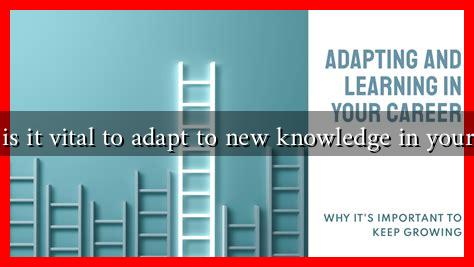-
Table of Contents
Why is it Vital to Adapt to New Knowledge in Your Field
In an era characterized by rapid technological advancements and an ever-evolving job market, the ability to adapt to new knowledge is not just beneficial; it is essential. Professionals across various fields must embrace continuous learning to remain relevant and competitive. This article explores the importance of adapting to new knowledge, the consequences of stagnation, and strategies for effective learning.
The Importance of Continuous Learning
Continuous learning is the process of constantly developing new skills and knowledge throughout one’s career. This practice is crucial for several reasons:
- Staying Relevant: Industries are changing at an unprecedented pace. For instance, the rise of artificial intelligence (AI) and machine learning has transformed sectors like healthcare, finance, and marketing. Professionals who do not keep up with these changes risk becoming obsolete.
- Enhancing Skills: New knowledge often leads to improved skills. For example, a software developer who learns about the latest programming languages or frameworks can create more efficient and innovative applications.
- Career Advancement: Employers value employees who demonstrate a commitment to learning. According to a LinkedIn report, 94% of employees would stay at a company longer if it invested in their career development.
The Risks of Stagnation
Failing to adapt to new knowledge can have dire consequences for professionals and organizations alike. Here are some potential risks:
- Job Loss: As industries evolve, roles may become redundant. For instance, the decline of traditional retail has led to significant job losses, while e-commerce has surged. Professionals who did not adapt to this shift found themselves out of work.
- Decreased Competitiveness: Companies that do not invest in employee training may fall behind their competitors. A study by McKinsey found that organizations that prioritize learning outperform their peers by 46% in terms of profitability.
- Limited Innovation: A stagnant workforce can stifle creativity and innovation. Companies like Google and Amazon thrive on a culture of continuous learning, which fuels their ability to innovate and lead in their respective markets.
Strategies for Adapting to New Knowledge
To thrive in a rapidly changing environment, professionals must adopt effective strategies for continuous learning. Here are some practical approaches:
- Online Courses: Platforms like Coursera, Udemy, and edX offer a plethora of courses across various fields. These resources allow professionals to learn at their own pace and on their own schedule.
- Networking: Engaging with peers and industry leaders can provide insights into emerging trends and best practices. Attending conferences, webinars, and workshops can facilitate valuable connections.
- Reading Industry Publications: Staying informed through journals, blogs, and newsletters can help professionals keep up with the latest developments in their field. For example, subscribing to publications like Harvard Business Review can provide valuable insights.
- Mentorship: Seeking guidance from experienced professionals can accelerate learning. Mentors can provide personalized advice and share their experiences, helping mentees navigate their career paths.
Case Studies: Success Through Adaptation
Several organizations have successfully adapted to new knowledge, demonstrating the benefits of continuous learning:
- IBM: Once primarily known for hardware, IBM transformed itself into a leader in cloud computing and AI. This shift required extensive retraining of its workforce, showcasing the importance of adapting to new technologies.
- Netflix: Originally a DVD rental service, Netflix pivoted to streaming and content creation. This adaptation not only saved the company but also positioned it as a leader in the entertainment industry.
Conclusion
In conclusion, adapting to new knowledge is vital for professionals in today’s fast-paced world. Continuous learning not only enhances individual skills but also contributes to organizational success. The risks of stagnation—job loss, decreased competitiveness, and limited innovation—underscore the necessity of embracing change. By leveraging online courses, networking, reading industry publications, and seeking mentorship, professionals can ensure they remain relevant and thrive in their careers. As the landscape of work continues to evolve, those who commit to lifelong learning will undoubtedly lead the way.
For more insights on continuous learning and professional development, consider exploring resources from LinkedIn Learning.


